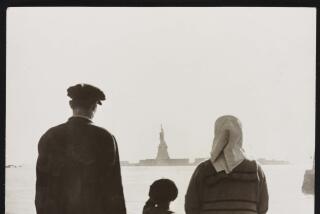A close look at a people’s historian
- Share via
“Howard Zinn: You Can’t Be Neutral on a Moving Train,” is not just another in the sea of topical political documentaries relating to the coming election. It’s a study of more than 50 years of political activism, as embodied by its still-active subject.
A writer, professor and historian, Zinn’s wrote the popular “A People’s History of the United States: 1492-Present,” which is in its fifth edition, having sold more than 1 million copies.
In it, he tells our country’s story from the viewpoint of the disenfranchised: Native Americans, suffragists, laborers, slaves and pacifists. The movie takes its title from his autobiography, which in turn comes from his exhortation to his students to stand up for their beliefs.
As he has written, “We don’t have to engage in grand, heroic actions to participate in the process of change. Small acts, when multiplied by millions of people, can transform the world.”
Documentarians Deb Ellis and Denis Mueller followed Zinn for four years, to college and high school campuses, antiwar protests and awards ceremonies. The footage, along with an array of archival material, is interspersed with interviews of Zinn as well as such notable friends and colleagues as Noam Chomsky and Alice Walker. It is narrated by Matt Damon.
The film traces the early roots of Zinn’s activism, from his childhood in a Brooklyn slum through service in World War II, which informed his antiwar beliefs. In 1956, he took a teaching job at Spelman College, a black college for women in Atlanta, where he was soon embroiled in the struggle for civil rights.
In 1964, he began teaching at Boston University, and became involved in the nascent movement against the Vietnam War. Now 82, Zinn is a professor emeritus at the university.
Watching the documentary was exciting -- and embarrassing, he said during a telephone interview: “It boosts your ego and also makes you want to shrink.”
Zinn is, not surprisingly, in the thick of the movement against the war in Iraq, accepting two to three invitations to lecture each week.
“Wherever I go and whatever I do, I try to connect history with what is going on now. What is going on now is the war.”
More to Read
Only good movies
Get the Indie Focus newsletter, Mark Olsen's weekly guide to the world of cinema.
You may occasionally receive promotional content from the Los Angeles Times.










